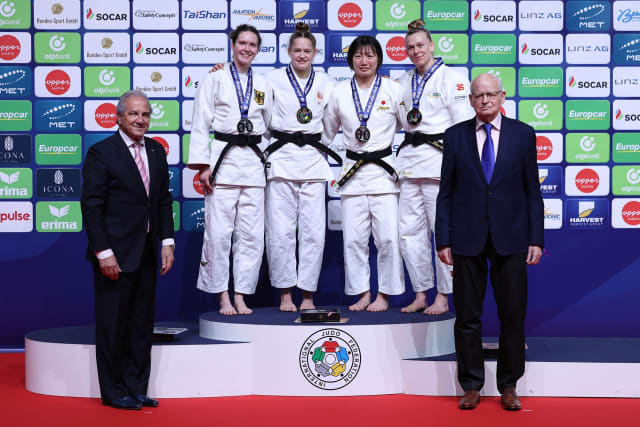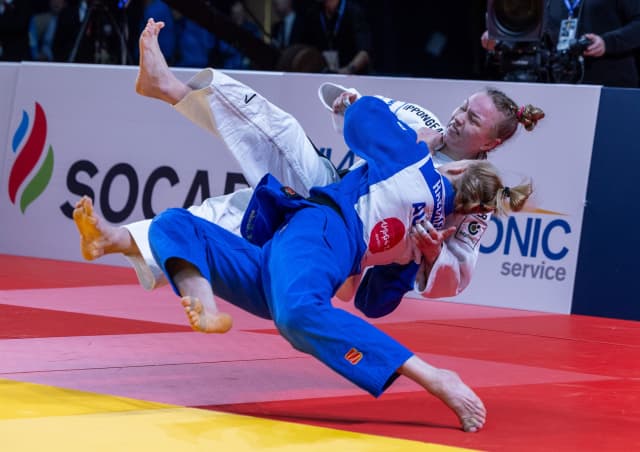While Saint-Etienne lost out to 7th seed Iva Oberan in round 2, Schmidt proved that her victory was no fluke, as she fought tooth and nail to make it all the way through to the final and guarantee herself a first ever World Judo Tour medal. In round 3 against Yergaliyeva (KAZ), she used hara-zutsumi to turn her opponent over and hold her down for ippon using kuzure-kesa-gatame.
In her quarter final against Deberdt (FRA), Schmidt applied juji-gatame in the second minute but the French athlete refused to submit. In the following exchange, Deberdt came forward, reaching over the back to try to take a strong cross-grip but the German responded immediately by throwing her opponent with a skilful obi-tori-gaeshi to score a beautiful ippon. A semi-final with the number one seed and world-ranked number 5 Katharina Haecker (AUS) awaited.
The Australian put Schmidt under pressure from the outset and even secured a hold down in the second minute, only for the German to escape a few seconds later. With time running out, Schmidt took her chance on the ground, once again using hara-zutsumi and kuzure-kesa-gatame to cause a huge upset and book her place in the final.
In the bottom half of the draw there was no stopping Joanne Van Lieshout (NED), the number two seed and current world bronze medallist. The 21-year-old continues to light up the IJF World Tour and she gave another assured performance in the preliminary rounds. She patiently turned over Coughlan (AUS) in round 2 and applied juji-gatame with 10 seconds remaining to take the victory. She further demonstrated her ne-waza prowess against Palumbo (ITA) in round 3, using ude-garami to turn her opponent over before tying up the arm and pinning her down using yoko-shiho-gatame.
Van Lieshout’s quarter-final against Oberan lasted just 26 seconds; she threw the Croatian with a powerful ura-nage in the first exchange. In her semi-final she took even less time to score ippon, as she only needed 17 seconds to turn over and submit Minami Aono (JPN), once again applying ude-garami.
It was clear that Schmidt would have her work cut out if she were to stop the flying Dutchwoman, and sure enough, in the final Van Lieshout was relentless, launching a flurry of attacks in the opening exchanges, not allowing any opportunity for Schmidt to do her judo. In the second minute, Van Lieshout followed through from a low kata-guruma attack to turn Schmidt over and hold her down with kami-shiho-gatame to score ippon and earn herself her second grand prix gold medal. It was a clinical performance from Van Lieshout which cements her place as one of the dominant forces in the category.
Aono took on Geke Van Den Berg (NED) who previously defeated Deberdt in their repechage contest, to decide the first of the bronze medals. Aono made several strong o-uchi-gari attacks through normal time but was unable to score. 45 seconds into golden score, the Japanese athlete managed to make Van Den Berg fall and the Dutchwoman put two hands on the mat behind her to defend, handing her opponent a waza-ari score. Aono adds a well-deserved bronze medal to her country’s tally at this event.
Oberan and Haecker fought for the second bronze medal. It was a tightly-contested left-versus-right encounter with both athletes battling to get their hips in front of the other. In the dying seconds, Haecker anticipated an attack from Oberan, changed direction and took her backwards, throwing with ura-nage to score waza-ari and win her 8th grand prix medal.










